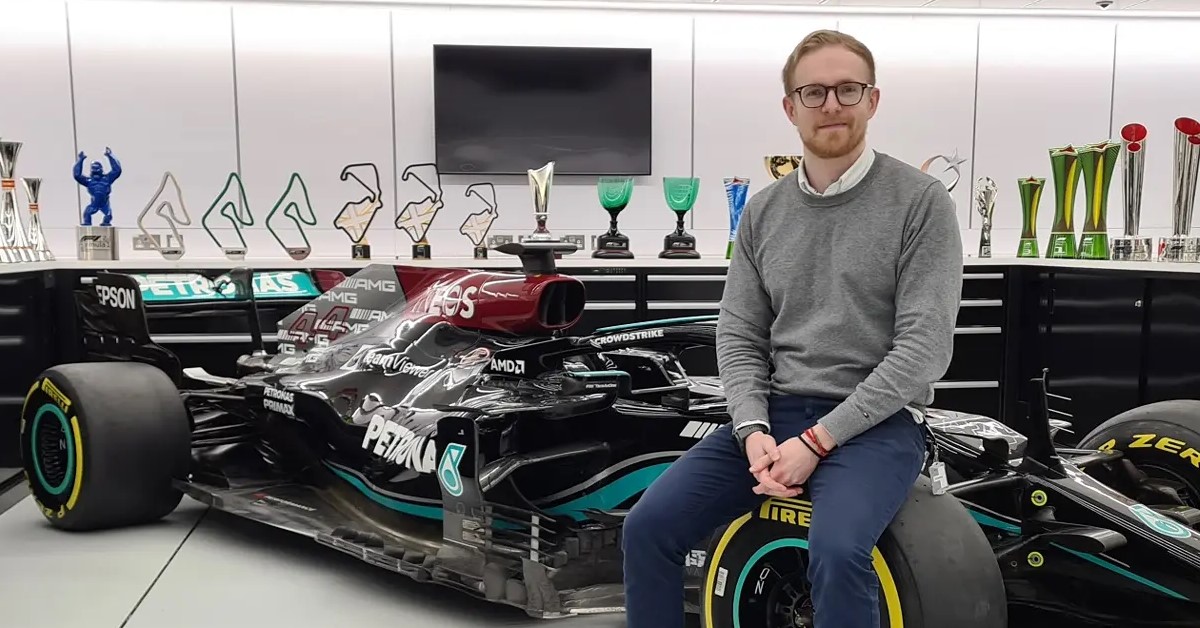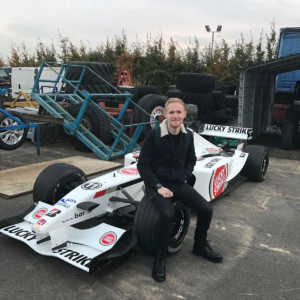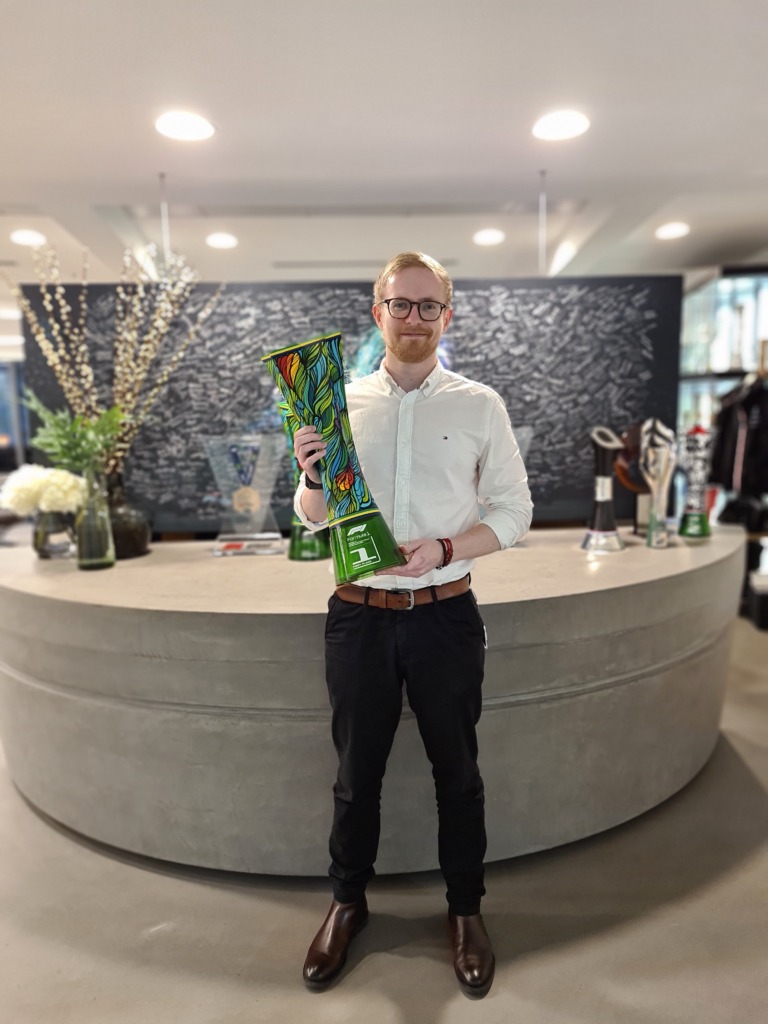Advanced Motorsport Engineering MSc alumnus Matthew Hunter talks about his exciting Formula One career, the challenges he’s faced along the way, and why choosing Cranfield was one of the best decisions he’s made
06/01/2023

Matthew Hunter completed the Advanced Motorsport Engineering MSc in 2017. Here, he talks about how he got into the motorsport industry, his experience of studying at Cranfield, and how he overcame setbacks to enjoy a fantastic career.
What sparked your interest in the motorsport industry?
It might sound strange, but despite watching motorsport, and particularly Formula One, from an early age, it wasn’t until I was in my early twenties that I began to realise it was an industry I was interested in working in. Unlike many of my peers, I didn’t study engineering as an undergraduate, I did physics instead – but I thought the innovation and top-end technology now prevalent in the industry could suit my skillset.
Initially I had been looking at more conventional engineering careers, but nothing had particularly sparked my interest. While plenty of engineering industries feature innovation, cutting-edge technology, and competition, I don’t think any involve all three to the same extent that motorsport does.
By nature, I’m a competitive person, and while the world of more conventional business is undoubtedly competitive, the idea of everything being fought out on-track, for the world to see, was one that was particularly attractive to me. As Toto (Wolff) has often commented, “the stopwatch never lies”, so I think the simplicity and purity of that appealed to me – outside of all the engineering ingenuity and political manoeuvring that are integral features of F1, the racing results are all that matter.
Why did you choose the Advanced Motorsport Engineering MSc at Cranfield?
As mentioned before, I studied physics as an undergraduate, so switching across to engineering (let alone a specialised industry like motorsport) felt like a long road ahead. I felt that if I could find a masters in motorsport engineering, it could potentially be a good stepping stone towards the end goal of finding a role in the industry. Having researched all the courses available in the UK, I felt confident that Cranfield was the best one out there for me in terms of both course content (which covered a wide range of motorsport engineering topics) and industry connections (not only does the course have a steering committee made up of industry experts, but a cursory LinkedIn search suggested that Cranfield alumni were distributed throughout the industry in large numbers).
With my background coming from outside of engineering, a wide range of course content was preferable to a more specialised course (especially as I wasn’t sure exactly what sort of role I wanted at the time), and with the industry connections I felt I would have a greater opportunity to network and “get my foot in the door” of an industry to which I had no connection before going to Cranfield.
How did you find the course? What were the highlights?
Personally I think deciding to study at Cranfield was one of the best decisions I’ve ever taken, and I put a lot of the success I’ve had in my career to this point down to the education I received during my course – I don’t think I would’ve had a career in motorsport without it. Having previously studied in Manchester – a huge and vibrant city – moving to Cranfield was a big culture change, and it took me some time to adjust – but once I was in the routine of getting fully stuck into my work (with fewer “distractions” available) I feel I was able to get the most out of the course.
As I’ve mentioned before, one of the reasons I picked Cranfield was its links to the industry, and many of my personal highlights revolve around these links. Regularly seeing race cars in person that I had only ever seen on TV, and being given the opportunity to tour several F1 teams’ factories (including my current workplace at Mercedes!) were very special experiences at the time, and have remained with me as reminders of how special and unique an opportunity the Cranfield course was.

What has your career path been since graduating?
I was fortunate to go straight into work upon leaving Cranfield in 2017 as a Graduate Engineer at Prodrive within their Advanced Engineering consultancy division. Given my more analytic background, I was placed within their Structures & Analysis team, who are responsible for all the structural and thermal analysis work within the business. Being a consultancy, working at Prodrive gave me a great opportunity to work across a wide variety of projects, from short term work for smaller automotive and mobility customers, to larger aerospace and military projects – and this was all good exposure for someone such as myself, who had no previous work experience. I worked for Prodrive for around three years, moving up to Analysis Engineer, before unfortunately being made redundant due to the economic fallout from the COVID-19 pandemic.
After this I struggled to find work within the industry, and had to work as a delivery driver for around six months. This experience was challenging, and a big blow to my confidence at the time as I was rejected from numerous job applications – but I feel I wouldn’t have been able to take the next step in my development as an engineer (and as a person) without it. Without this very humbling experience I don’t believe I would’ve had the openness and confidence to be myself in my interview with Mercedes-AMG PETRONAS, and subsequently wouldn’t have been successful in it. I began working as a Graduate Structural Analysis Engineer (Composites) for Mercedes-AMG PETRONAS Formula One Team in February of 2021, just a week prior to the launch of W12.
Nearly two years on, working for the best Formula One team on the planet continues to be a dream come true, and while the work is undeniably challenging, I continue to be grateful for the faith the team has put in me, and the team ethos and culture remains a constant source of support during even the most difficult periods of work.
What does a typical week look like for you?
My typical week consists of supporting the design work on the latest update or design iteration by building and running finite-element models, and analysing results to ensure the parts that we are designing are strong/stiff enough, and as light as possible. This requires a great deal of communication between myself and the design team to ensure that we are both working with the most up-to-date information available, and ensures everyone has buy-in to any design changes we are making. I am also responsible for liaising with our aerodynamics department to feedback on the possible structural effect of any changes they might be making, as well as supervising the test-and-development team during the physical testing of our parts to help ensure that the loading is representative of track conditions.
In addition to these design-related tasks, I also frequently work race weekends as the stress support contact for the trackside engineering team, meaning that I am responsible for checking the loads on the car during an event, and providing support/advice about whether a part should be quarantined or replaced if it sees an unexpectedly high load. This can be a stressful job, particularly as feedback is required very quickly with the shortened times between sessions this season, but it can also be very rewarding. I was lucky enough to be working in race support (in our “mission control room” back in Brackley) when Lewis won his 100th GP in Russia in 2021, which was a very special experience to be a part of!
What would you say to someone who wants to work in the motorsport industry?
For me personally working in motorsport is as much about your mental approach as it is about technical ability. There will be multiple periods when the work is extremely intense, due to short deadlines or a particularly challenging problem to overcome – and during these periods keeping a level-head and a clear mind are arguably the most important attributes to have – so these are things I personally work on a lot, and would recommend as things to focus on to all prospective motorsport engineers. This kind of mental approach – not letting negative thoughts run away with you, or becoming overwhelmed by the technical mountain you still have to climb – are, in my opinion, hugely important to not only success in the motorsport industry, but also longevity in the industry too.
The only other thing I would say is: if my journey – from not having an engineering degree, to being made redundant and working as a delivery driver, to ending up working for a top team in Formula One – shows anything, it’s that there isn’t one route into motorsport, and even with setbacks, if you’re willing to work hard and persevere you can find your place in the industry.
Is there anything else we should know about you?
If anyone has any further questions, then I’m happy to be contacted through LinkedIn.

Categories & Tags:
Leave a comment on this post:
You might also like…
Company codes – CUSIP, SEDOL, ISIN…. What do they mean and how can you use them in our Library resources?
As you use our many finance resources, you will probably notice unique company identifiers which may be codes or symbols. It is worth spending some time getting to know what these are and which resources ...
Supporting careers in defence through specialist education
As a materials engineer by background, I have always been drawn to fields where technical expertise directly shapes real‑world outcomes. Few sectors exemplify this better than defence. Engineering careers in defence sit at the ...
What being a woman in STEM means to me
STEM is both a way of thinking and a practical toolkit. It sharpens reasoning and equips us to turn ideas into solutions with measurable impact. For me, STEM has never been only about acquiring ...
A woman’s experience in environmental science within defence
When I stepped into the gates of the Defence Academy it was the 30th September 2019. I did not know at the time that this would be the beginning of a long journey as ...
Working on your group project? We can help!
When undertaking a group project, typically you'll need to investigate a topic, decide on a methodology for your investigation, gather and collate information and data, share your findings with each other, and then formally report ...
From passion to purpose: My journey at the Pinnacle of Aviation
By: Sultana Yassin Abdi MSc Air Transport Management, Current Student Born and raised in the vibrant landscape of the UAE, with roots stretching back to Somalia, my life has always been ...






